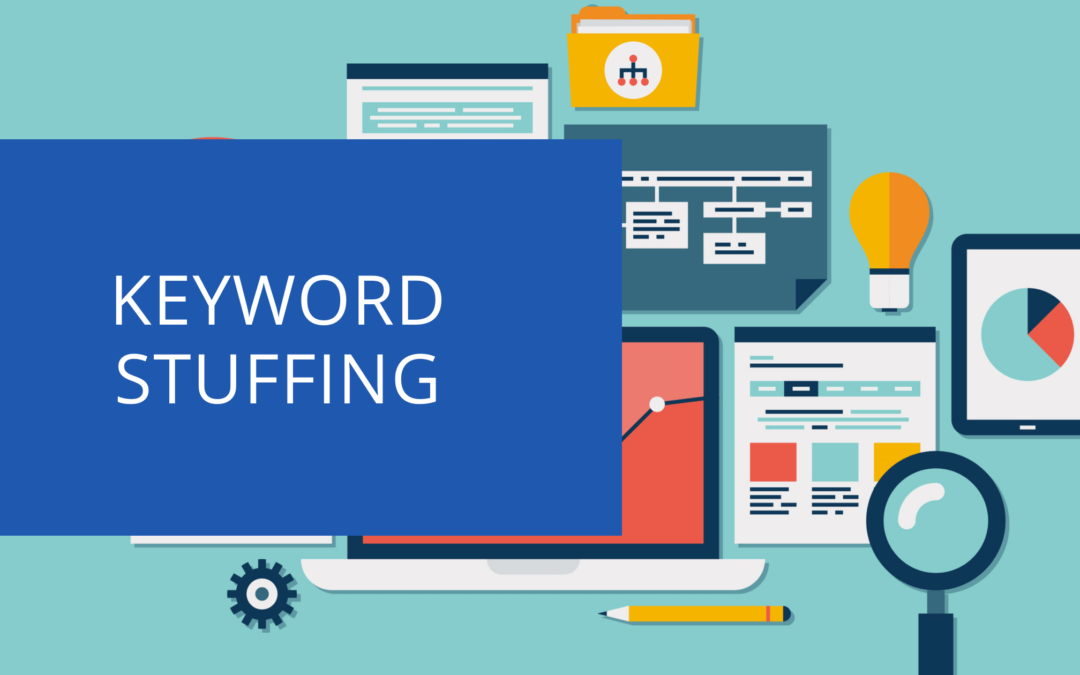Google’s algorithm is ever-changing and it can be difficult to know if you’re doing something that could get your site penalized. One of the most common penalties associated with SEO is a penalty for keyword stuffing.
This article discusses what happens when you overuse keywords on your website and how it might affect your rankings on search engine results pages (SERPs).
Contents
Can you get a keyword stuffing penalty from Google?
Yes, you can get an algorithmic penalty from Google for keyword stuffing. Keyword stuffing is also known as irrelevant keywords is a quality issue in Google’s Webmaster guidelines. But bear in mind, there are two types of Google penalties, algorithmic penalties, and manual penalties.
What are algorithmic penalties?
Google updates its algorithm regularly to provide the best results for its searchers. Some algorithm updates are designed to lower the rank of pages that violate guidelines while others are designed to increase rankings for pages that meet new prioritised ranking factors.
A website can experience an increase in rankings and traffic because it meets the criteria for the new prioritised factors or a drop if it is has violated Google’s Webmaster guidelines.
What are manual penalties?
Manual penalties are issued by an actual employee at Google when they detect unnatural link building, content quality, or other violations of their Webmaster guidelines.
What is keyword stuffing?
Keyword stuffing is the process of adding a large number of keywords to a page in an attempt to manipulate its ranking in search engine results pages.
Google’s Webmaster guidelines give the following examples of keyword stuffing:
- Lists of phone numbers without substantial added value
- Blocks of text that list cities and states that a webpage is trying to rank for
- Repeating the same words or phrases so often that it sounds unnatural, for example: We sell custom cigar humidors. Our custom cigar humidors are handmade. If you’re thinking of buying a custom cigar humidor, please contact our custom cigar humidor specialists at [email protected].
What is Google Panda?
 Google Panda is an algorithmic penalty that was first released in February 2011. The goal of Panda was to lower the rank of pages with low-quality content.
Google Panda is an algorithmic penalty that was first released in February 2011. The goal of Panda was to lower the rank of pages with low-quality content.
Since its initial release, Google Panda has been updated regularly to provide the best results for its searchers. Some of the most recent updates have been designed to target pages that contain intrusive advertising and low-quality content.
Keyword stuffing can be seen as low-quality content that does not meet the quality standards set by Google.
How to fix an algorithmic Google penalty
Google penalties can be reversed by solving the reasons they were given in the first place. To help diagnose a drop in traffic is see when you experienced the drop if it corresponds to the release of an algorithm update. You can then research about that particular update and make any necessary adjustments or any needed modifications to your existing content
This will ensure that Google’s algorithms see your website as a safe, high-quality site again and you’ll begin to increase traffic from search engines again.
What are the consequences of a Google penalty?
If your website is hit with a Google penalty, you can expect to see a significant decrease in traffic. In some cases, the website may be removed from search engine results pages altogether. The consequences of a Google penalty can be very serious and should not be taken lightly. It’s important to take action immediately to try and resolve the issue.
Penalties can be applied at a keyword level, URL or directory level, domain or site-wide level, or a complete delisting / de-indexing
With a keyword-level penalty, you will experience a drop for a particular keyword. With a URL or directory level penalty, the drop will be noticed on a particular URL. A domain-wide penalty can see a drop for all keywords across a website. A de-indexing will see a website removed from the Google index.
How many keywords is considered keyword stuffing?
There is no set number of keywords that will get you a penalty for keyword stuffing. It depends on how the keywords are used and whether or not they add value to the page. Generally, if the content sounds unnatural or forced, Google will likely penalise your site.
Incorporate keywords naturally into your content as you would during a conversation. Instead of focusing on just one term, use long-tail or LSI keywords. For assistance, you may use keyword research tools.
How does Google determine if you’re keyword stuffing?
Google’s algorithms determine if a page is keyword-stuffed by looking at several factors, such as the density of keywords on the page, the use of keywords in titles and headings, and how well the keywords are used to help users understand the content.
Do I need to worry about getting penalised for keyword stuffing?
 If you’re using keywords naturally and they are helpful to users, you don’t need to worry about getting penalised. However, if you are trying to artificially boost your rankings by using excessive keywords or hiding text, you may be penalised.
If you’re using keywords naturally and they are helpful to users, you don’t need to worry about getting penalised. However, if you are trying to artificially boost your rankings by using excessive keywords or hiding text, you may be penalised.
How to fix a manual Google penalty
If you’ve received a manual penalty from Google, it will be indicated in the Search Console messages. To resolve the issue, you’ll need to take action on the issues that were flagged by Google.
Some of the most common reasons for manual penalties are: spammy links, hacked pages, malware, and cloaking. Once you’ve fixed the issue, you can submit a reconsideration request to have the penalty lifted.
Once fixed, you can submit it for review in Google Search Console. Google will review and approve the request if the required changes have been made.
It’s important to note that not all manual penalties can be resolved. In some cases, the site may need to be completely overhauled before a request can be made.
How long do Google penalties last?
The time needed to recover from a Google penalty will depend on the type of penalty and how quickly you can fix it.
If your site has been hit with a manual penalty, the penalty can last until you fixed the issues and Google has reassessed your site which can take 3 months or more.
An algorithm penalty can take as long as it takes for you to fix the issues and Google to reevaluate your website which can take 3 months or more.
Where can you include keywords on a web page?
Keywords can be placed in many places on a website, including:
- Page title
- Headings tags
- Meta description
- Body Content
- Image alt tags
- Website menu, header, and footer
- Schema data
- Page tags
- URLs
Being able to use a keyword in all these places might have you thinking how many keywords is too much. To prevent a keyword stuffing penalty, you should:
- Use keywords naturally and sparingly
- Research longtail and LSI keywords to use instead of just one main keyword
- Write for users, not search engines
- Avoid using excessive keywords or hiding text on your page.
It’s difficult to give an exact keyword density to adhere to But, you can take a more scientific and highly recommended approach by using a tool like Surfer SEO.
Surfer SEO is a keyword-density tool that will help you to make sure your keywords are used in a way that doesn’t look spammy, are natural, and advise where to use them on the page to be completely optimised for a keyword.
If you follow these tips, you can help ensure that your site doesn’t get hit with a Google penalty.
What can cause a Google penalty?
 Google’s Webmaster guidelines include the main types of violations that can lead to a penalty:
Google’s Webmaster guidelines include the main types of violations that can lead to a penalty:
- Automatically generated content: Automatically generated content is created by software, such as a spambot, and can include large amounts of copied content or low-quality content.
- Sneaky redirects: Sneaky redirects are redirection tricks used to mislead users or search engines, for example, by disguising affiliate links as navigation links.
- Link schemes: A link scheme includes unnatural links intended to manipulate search results.
- Thin content: Thin content is low quality text that provides little or no value to users. It can be difficult for a website visitor to understand why the page exists and what it offers.
- Paid links: Paid links are links exchanged for money or other compensation.
- Cloaking: Cloaky pages are designed to display different content for users and search engines.
- Hidden text and links: Hiding text or links can be done by making them the same colour as the background or making them very small.
- Doorway pages: Doorway pages are sites or pages created to rank for specific, similar search queries which can lead to multiple similar pages in the search results, where each result ends up taking the user to essentially the same destination.
- Scraped content: Scraped content is copied from other websites without adding any original value.
- Affiliate programmes: Penalties for affiliate programmes can be for sites or pages that offer no value to users.
- Irrelevant keywords: Irrelevant keywords covers keyword stuffing.
- Creating pages with malicious behaviour: This includes hacked pages, malware, and phishing schemes.
- Automated queries: Google can penalise sites that send automated queries to their servers.
- User-generated spam: Google can penalise sites that have too much user-generated content that is spammy.
We Offer SEO Services Nationwide
- Chester:https://mediakynect.co.uk/seo-chester/
- Wirral: https://mediakynect.co.uk/seo-wirral/
- Liverpool: https://mediakynect.co.uk/seo-liverpool/
- North Wales: https://mediakynect.co.uk/seo-north-wales/
- Wrexham: https://mediakynect.co.uk/seo-wrexham/
Conclusion
Google’s Webmaster Guidelines are designed to help site owners avoid penalties by avoiding common violations. If you follow the guidelines, you can help ensure that your site doesn’t get hit with a Google penalty.
There are many different types of Google penalties and the time needed to recover from them will vary depending on the type of penalty and how quickly you can fix it.

